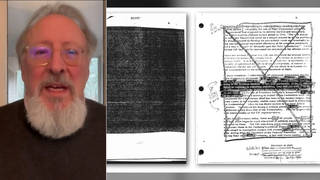
As Hurricane Sandy makes its way to the Eastern Seaboard of the United States, it has already left behind a trail of destruction in Haiti, Jamaica and Cuba. Government officials have reported 65 storm-related deaths across the Caribbean, with 51 of those in Haiti, which had three days of continuous rainfall that ended only on Friday. Flooding has since ravaged the southwestern areas of the impoverished country, and given the extent of the damage, the death toll may rise. Haiti is still suffering from the effects of Tropical Storm Isaac, which battered the country in late August, resulting in heavy flooding in the camps where some 400,000 survivors of the 2010 earthquake still live. We’re joined from the capital of Port-au-Prince by Haitian pro-democracy activist Patrick Elie. [includes rush transcript]
Transcript
AMY GOODMAN: I want to turn south for a moment to Patrick Elie. He’s a pro-democracy activist in Port-au-Prince, Haiti. The death toll in Haiti is the worst of any place right now as a result of this superstorm.
Patrick, welcome to Democracy Now! Can you describe what has happened in Haiti? What are the effects of the storm? I’m going to see if we’re able to get him on. We keep losing him through the show.
PATRICK ELIE: Yes, you know, it’s been devastating, even though the eye of the storm did not go through Haiti, but it dumped a lot of rain, especially on the western department and all the southern peninsula. And given the vulnerability of Haiti’s environment, it has created tremendous devastation. You mentioned the death toll, but also, you know, roads have been destroyed. Whole villages have, for all intent and purposes, disappeared. So, it’s a very serious situation.
AMY GOODMAN: The storm left a trail of destruction in making its way to the Eastern Seaboard in the United States, already leaving this destruction—Haiti, Jamaica, Cuba, government officials reporting 65 storm-related deaths across the Caribbean, 51 of those in Haiti, which had three days of continuous rainfall that ended only on Friday. Flooding has since ravaged the southwestern areas of your country of Haiti. This is Johan Peleman, the head of the United Nations Office for Coordination of Humanitarian Affairs in Haiti.
JOHAN PELEMAN: So, the entire southern peninsula, including the province, the county where Port-au-Prince is, had been—has been very heavily affected with flooding. Rivers have burst out of their banks, the canals running through Port-au-Prince, because Port-au-Prince lies in a valley surrounded by hills. What we fear most is that there might be spikes in waterborne diseases, especially cholera, which we always see after flooding or rains in Haiti.
AMY GOODMAN: So the death toll may clearly rise in Haiti, which is still suffering from the effects of Tropical Storm Isaac, which battered the country in late August, resulting in heavy flooding in the camps, where some 400,000 survivors of the 2010 earthquake still live. And I saw you, Patrick Elie, in Haiti after the earthquake. What about this coming together of these crises over the last years?
PATRICK ELIE: Yes, it’s been, as you say, like a string of crisis, for which, I think, you know, no one can be held responsible. But certainly, the way these crises have been handled has been less than optimal. And, for example, you mentioned the refugees, the people in the camps. And what this government has done is cleared the camps that were the most visible, you know? It’s—it was mostly a cosmetic affair. And nobody knows what happened to these people who were in the main square of Champs de Mars or Pétionville. You know, they’ve been removed from eyesight, but to go to what kind of life? And that does not seem to preoccupy the authorities.
Now, to come back to Sandy, nobody can hold the government responsible for the vulnerability of Haiti, but certainly this is a government that has done all it could to create a political and social tension in the country. And that weakens us to face this new challenge. And I think that’s the main obstacle. And also, you have to realize that already people were starting to protest the way this government has been handling the affairs of this country, and now it’s going to get only worse, because this is a government that is—
AMY GOODMAN: Patrick Elie, we’re going to have to leave it there, because we’ve come to the end of the broadcast. Patrick Elie, speaking to us from Haiti, Arnie Gundersen speaking to us from Vermont. That does it for the broadcast. I’ll be speaking tonight in Salt Lake City. You can check our website at democracynow.org.













Media Options